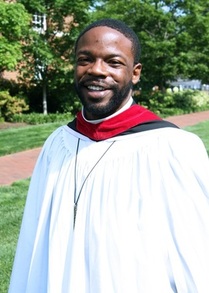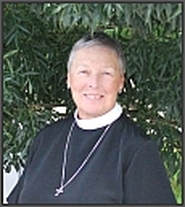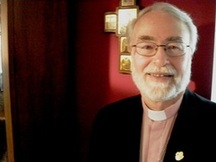 #BibleChallenge #DailyBread - Romans 8: "Why Do We Suffer?"
St. Paul talks a lot about suffering and advises us to rejoice in affliction: http://ow.ly/1WVvpF. Yet, the question of suffering's purpose remains.
In Chapter 8 of Romans, St. Paul slips in an answer to the question, which is quite compelling. In verse 18 he says, "for I consider that the sufferings of this present time are not worthy to be compared with the glory which shall be revealed in us."
Basically: the magnitude of the suffering we experience now does not compare to the magnitude of the glory we will experience in God's Kingdom. In other words, we are joyful in suffering because through suffering we are reminded of how immense will be the glory of the Kingdom - should we continue in faithfulness.
No, this knowledge doesn't make suffering any easier. And, St. Paul knows this too.
Hence he reminds us that "the Spirit also helps in our weaknesses" (vs. 26). The Spirit
makes it possible to hope: to remain confident of redemption in the midst of our
suffering. The Spirit helps us to reinforce our hope through prayer - even when we are
so beaten down that we don't know what to pray...how to pray...why to pray. Because of
our hope we are able to persevere in suffering...continuing in faithfulness.
What are your thoughts on suffering?
For more #DailyBread follow Fr. Jah Bread on twitter: @Jah_Bread or like him on
Facebook: www.Facebook.com/JahBreadSite.
 BIBLE CHALLENGE
Day 144
I Chronicles 16-18; Psalm 119:33-72; Romans 7
David sings eloquent praises to the Lord and wants to build a magnificent home for the Ark of the Covenant. When that idea is rejected by God, David makes do with songs of praise, “O give thanks to the Lord, call on his name, make known his deeds among the peoples. Sing to him, sing praises to him, tell all of his wonderful works.” (I Chronicles 16:8-9)
The psalmist in fear and distress cries out seeking guidance from God and promising obedience in return, “Teach me O Lord, the way of your statues, and I will observe it to the end.” (Psalm 119:33-34).
Paul hits the nail on the head when he writes to the Romans, “So then, with my mind I am a slave to the law of God, but with my flesh I am a slave to the law of sin.” (Romans 7:25) Paul understands that more than praise and promises are needed.
It’s hard not to keep nodding our heads in continual affirmation as Paul, time after time, in his Letter to the Romans pounds home the painful message of our human shortcomings. How true the statement, “I do not understand my own actions. For I do not do what I want, but I do the very thing I hate. Now if I do what I do not want, I agree that the law is good. But in fact it is no longer I that do it, but the sin that dwells in me…Now if I do what I do not want, it is no longer I that do it, but sin that dwells within me.” (Romans 7:15-20)
We strive to build a life that is Christ-centered. We spend a fair amount of time singing praises to the Lord, in one way or another. We follow the rules and regulations of society, to the best of our ability.
Yet, Paul’s reality check, “So then, with my mind I am a slave to the law of God, but with my flesh I am a slave to the law of sin” remains the same, age after age.
I have found that only the discipline of daily prayer and continual conversation with God brings me back into right relationship with my Savior. I need to stay engaged with Father, Son and Holy Spirit. They are my strength – my guide – my point of reference.
How do you best counter the human struggles that Paul so eloquently describes?
The Rev. Clelia P. Garrity, St. Paul’s Episcopal Church, Delray Beach, FL
 Wednesday, May 29, 2013 Day 143 – I Chronicles 13-15, Psalm
119:1-32, Romans 6
In a previous reflection, I remember quoting T.S. Eliot in Murder in the
Cathedral: "The last temptation is the greatest treason: to do the
right deed for the wrong reason." The theme that emerges for me today is
another temptation to be avoided: to do the wrong deed for the right
reason. For me, the latter is the more difficult discernment at
times. There is such a tightrope we must walk on our spiritual
journey: to use all of our talents to the best of our ability, and at the
same time to constantly be attuned to the will of God in our lives. Saul
was incredibly gifted, yet as we saw earlier in I Chronicles, "Saul died for his
unfaithfulness; he was unfaithful in that he did not keep the command of the
Lord..." (I Chronicles 10: 13a). Saul in some way lost his connection with
God and consulted a medium for guidance instead.
In reading through the I Chronicles chapters for today, at first I wanted to
start singing, I Will Dance Like David Danced. I love the joyful
exuberance of that song. Yet, on closer examination, there are some hints
in these chapters that all is not well with David and his people's dance with
God. David starts by saying to the people, "If it seems good to you, and
if it is the will of the Lord our God," but then there is no evidence that the
consulting he does with the leaders has been done with God as well. They
prayed that God would bless what they were doing (transporting the Ark with the
new cart), but perhaps they should have prayed for guidance in how they were
doing it.
Back in Exodus 25, God was clear that the Ark was designed to be carried (not
carted), and it was supposed to be carried by specific Levites who were
Kohathites. (Numbers 4:15). Further, even those specified by God to carry
the Ark were not to see or touch the Ark, or they would die. Uzzah touches
the Ark and is struck dead, and David is angry with God as a result. Let's
do a little logic check here:
1) God says: here is how I want this
done. Here is who I want to do it. And by the way, if you don't
follow the how and the who, you will die.
2) David doesn't follow the how and the who.
3) The person dies -- and David gets upset with God.
Maybe if David had put a little more discernment into his planning he would
have remained faithful to the clear instructions God had given. Perhaps
the same would have been true for Uzzah. Even if Uzzah had every good
intention to protect the Ark from falling, if the Almighty has already said,
"Touch this and you will die," perhaps I would want to keep that in mind.
Somehow, David learns from the experience, because in I Chronicles 15:2a, "David
commanded that no one but the Levites were to carry the ark of God, for the Lord
had chosen them to carry the ark of the Lord."
It becomes a powerful reminder that our ministry is first and foremost to do
things God's way, not mine. It might seem restricting at times, but Paul
reminds us today of the advantages: "So what advantage did you then get
from the things of which you now are ashamed? The end of those things is death.
But now that you have been freed from sin and enslaved to God, the advantage you
get is sanctification. The end is eternal life. For the wages of sin is death,
but the free gift of God is eternal life in Christ Jesus our Lord" (Romans 6:
21b-23).
It would be easier for me if God's commands were clearer for the everyday
discernment I must undergo. Were God to tell me, "Do this and you will
die," I think the choices would be clear cut. But it is not that clear
most of the time -- at least for me. (I haven't been struck dead yet so I
guess we're doing okay.) What it does point to is the urgency to stay in
intimate relationship with God in prayer, to examine and re-examine my motives
and my actions. That is the only way I will be able to live out the
psalmist's proclamation today, "Happy are those whose way is blameless, who walk
in the law of the Lord (Psalm 119: 1). To borrow a marketing buzzword, the main
Constant Contact I need in my life is with God, so that, in the words of the
Thomas Merton prayer, "I hope that I will never do anything apart from that
desire (to please You)."
Peace,
Marty Zlatic
 May 28, 2013, Day
1 Chronicles 10-12, Psalm 118, Romans 5
Good News –
They say that bad news travels fast, but according to some research out of the University of Pennsylvania back in 2010, good news travels faster. That may be, but first you have to consider, good news for whom?
In Romans 5, however, we read the Good News. The Good News of Christ is the free gift of justification! Through faith, it is available to all. “…so one man’s act of righteousness leads to justification and life for all.” It must be noted that relationship is at the heart of the matter. To know this justification, we must first know Jesus as Lord.
Recently, I was talking to someone who was recounting a funny story from Tom Sawyer. In the story the children had received tickets for memorizing Bible verses. Tom, a terrible student if there ever was one, had no tickets. But he traded others for their tickets, some for candy others for other trifles. It turned out he had the most when the new Bible was to be distributed. The Superintendent of the Sunday school was amazed when Tom Sawyer came up with his tickets indicating that he had memorized two thousand verses! Now he was given the opportunity to show his knowledge to a prestigious member of the community, Judge Thatcher. The Judge asked Tom to tell him the names of the first two disciples. “David and Goliah!” was his answer. I laughed, the man telling the story laughed, but the others just smiled. They didn’t know the story.
I hope that as you are reading these scriptures, that you are remembering that the promises and the Good News that we find in them needs to be shared. We don’t want to be the only ones laughing in the end.
All love,
Cori Olson
Priest in Charge
St. Luke the Physician Episcopal Church
 Reflections for May 27, 2013 Day 141
I Chronicles 7-9, Psalm 117, Romans 4
The Ven. Dr. Bryan A. Hobbs
Paul’s Letter to the Romans is one of the clearest statements we have on “faith” and “grace”. Paul’s dramatic conversion chronicled in Acts 9, 22, and 26 is the backdrop for all of Paul’s dramatic writings in Romans. Faith and Grace are the cornerstones of the change which took place in Paul and which has had such a profound impact on the Church.
To begin with, Paul was a Pharisee’s Pharisee. He was such a zealot, so absolutely right, that he was about the business of destroying the early Christians infidels. He presided over the stoning of Steven and was on his way to Damascus in order to carry out even greater carnage. He, like the other Pharisees, was certain that they were correct about their “faith” and about the infidelity of those who followed Jesus! Paul and the Pharisees ever stand before us as examples of those who, from time to time, emphatically proclaim that they are right…righteous...when that is hardly the case much to their own demise as real truth is revealed. We often refer to such people as “self-righteous” because they fail to bear witness to the “real” truth.
Paul is the example of how Jesus can change even the most hardened heart by his very presence and call to ministry. Paul, being well versed in Scriptures and in the traditions of Judaism, was not your average person with religious convictions but a man of faith turned to zealous proclamation of what he knew. What a surprise…a blinding surprise…for Paul and all of us to realize that what he/we may have learned was only partial and what was being revealed by Jesus was complete and eternal. Wow…Paul’s firsthand experience with the Risen Lord changed his and our lives forever. All of Paul’s writings, especially Romans, is an attempt to put into words and actions the implications of what happened to him on the Road to Damascus, “the experience of God’s grace”. Rom. 5:2
Romans 4 is part of Paul’s argument that “faith” is the precursor of all and finds its origin as far back as Abraham, “the father of our race.” Rom. 1:1 In Romans 4 Paul lays out his argument about “faith” followed in Romans 5 by his magnificent statements on “grace”. In many ways “faith & grace” are so linked in Paul’s experience that there is barely a hair’s breadth between the two.
In Roman’s 4 we have such memorable phrases that have so enriched our faith. “Abraham believed God, and because of his faith God accepted him as righteous.” (Vs 3) Paul is want to make a clear distinction between the “works” of faith and “faith” itself. For Paul, the cornerstone of Christianity is a person’s faith from which all behavior is transformed and not the other way around. “God puts people right through their faith in Jesus Christ.” (Rom.3:22) This is Paul’s experience and is the crown of his gift to us all. I personally think that there is room for “works” leading to “faith” but Paul’s witness is very impressive and persuasive.
Paul continues with statements that define and inspire our faith. “…Abraham is the spiritual father of us all.” “Abraham believed and hoped, even when there was no reason for hoping, and so became ‘the father of many nations.’” (Vs 16-18) Paul’s insights have greatly inspired us for 20+ centuries and offered hope to millions who have been driven to the brink of despair and hopelessness. Paul’s experiences with faith in Jesus Christ always brings him and us back to hope “…even when there was no reason for hoping…” And then Paul scribes that Abraham believed in “the God who brings the dead to life and whose command brings into being what did not exist.” (Vs 17-18) What a huge statement of hope and faith to which everyone can receive a portion of the breath of God.
Finally, Paul writes his final declaration on “faith” before moving to an even more transforming reality – “grace” in chapter 5. “His (Abraham’s) faith did not leave him, and he did not doubt God’s promise; his faith filled him with power, and he gave praise to God.” (Vs 20). All of what Paul is describing reminds us so much of the disciples continuing experience of Pentecost. Our lives are continually renewed by our “faith” which is a wonderful gift of the Holy Spirit. Romans 5 brings this into much clearer focus.
 Bible Challenge
Day 139
I Chronicles 4-6 There are three main historical sources in the Old Testament. We have just finished reading the “Deuteronomic” history (the books of Deuteronomy through II Kings). Earlier we read the Priestly history found in Genesis through Numbers. We are now embarking on the work of the “Chronicler,” found in I and II Chronicles as well as the books of Ezra and of Nehemiah.
As you work your way through I and II Chronicles in the coming weeks you will notice many parallels with what we already read in the Samuel and Kings books. The Chronicler traces roughly 600 years of history, from the time of King David around 1000 BCE to approximately 400 BCE or even a bit later.
The Deuteronomic history ends with the Babylonian Exile, so the overlaps only occur for the first 4 centuries of the Chronicler’s history. The Chronicler is our most important source for information on post-Exile Judaism.
Even when we see overlapping parallels with events recounted in the Deuteronomic history, there is a definite difference in emphasis in the Chronicler’s work. While the Deuteronomist has a theological viewpoint, this historian shows much more emphasis on political developments than does the Chronicler. The Chronicler is primarily interested in establishing Israel’s role as a liturgical, worshipping community rather than as a nation. In keeping with this liturgical interest, the first nine chapters of I Chronicles is a long series of genealogies. These chapters make for incredibly boring reading, but the genealogies are intended to establish Israel’s place as the Chosen People as well as to establish the ancestry (and hence the legitimacy) of the Temple priesthood going all the way back to Moses’ brother Aaron.
Psalm 116 This psalm could only have been written by someone who had “been around the block.” Clearly this poet had suffered many real lows in his (her?) life, but came through them all and in retrospect is able to perceive that the Lord had indeed sustained him (her) through all trials. The poet wants to express thanks to God publicly, “in the courts of the LORD’S house.”
Romans 3 Paul’s letter to the Church at Rome seems to be, at least to a large extent, addressing issues of tensions between Jewish Christians and Gentile Christians. As a Jewish Christian, Paul is sometimes addressing his fellow Jewish Christians; as the “Apostle to the Gentiles” he is at other times addressing the Gentile Christians. After the introductory chapters of the Letter, chapter three begins in earnest Paul’s extended reflection on the place of Jews and Gentiles within the Church. Paul makes an eloquent plea for tolerance between Christians of different stripes and emphases, a good message for American Christians to hear in our pluralistic land with a multiplicity of expressions of Christian faith. (“One faith, many cultures,” I often say!)
 Day 138 Reflection
I Chronicles 1-3, Psalm 115, Romans 2
The Rev. Mark Andrew Jones, BSG
Today we leave behind the first and second books of Kings and begin to read the first book of Chronicles. As we do so, we might be challenged by the extensive genealogies to maintain our interest. The genealogies form a shorthand means by which to retell the grand story. Since many names in the Chroniclers genealogies are not familiar one is likely to miss some subtle messages. By sequence and length, the Davidic line and kings of Judah are stressed, while the notion of “Israel” is inclusive of both the Southern and Northern Kingdoms. Soon one realizes that a “whitewash” of sorts is occurring. There is no reference to the civil war that ensued after Saul’s death, or of the violation of Tamar and the rebellion of Absalom. Israeli identity is becoming David-centric or Davidic.
The Chronicler’s good news is that God continues to act down through the generations. And, as we see elsewhere, God continues to work for good through David’s line. “Not to us, O Lord, not to us, but to your name give glory, for the sake of your steadfast love and your faithfulness.”
Yes, we make mistakes and we sin, but the Letter to the Romans makes clear that God’s kindness is meant to lead us in a better way. We cannot judge that Way by outward signs of obedience, however. No, it is first and foremost a matter of the heart.
 The Bible Challenge, Day 136: 2 Kings 22-24, Psalm 113 and Acts 28
After listening to the story of Israel’s Kings, we encounter Josiah, an honorable, righteous leader, who cares about pleasing God. When Josiah receives God’s instructions in a long-lost holy scroll found in the Temple, he repents on behalf of his people, God’s Chosen People, ripping his clothes in two, and leading a purification of the nation. With an ardent, righteous focus, Josiah destroys all the pagan places of worship he can find. His purification of Israel is short-lived, because his descendants do not share his righteous zeal but slide into the lax ways of their other forbears, allowing shrines to pagan gods to dwell in their midst. For their unfaithfulness, Israel suffers defeat to the Babylonians, who take them captive. God cannot tolerate apostasy from a people chosen to preserve God’s Holy Name in this world. The Babylonian defeat begins the Jewish Diaspora, the scattering of the Hebrew nation across north Africa and Asia Minor, the great sadness of the people in their history.
From here we move to Psalm 113, a song of praise to God who is the Lord, the only Lord. The psalm praises God, who comes down to see what is happening in Creation, and the Holy One reaches out in acts of mercy to the vulnerable. God cares about us and responds to our true needs, but not necessarily to our insatiable appetites.
In the last chapter of the Acts of the Apostles, we encounter Paul, using his breath while there is life in him to share the gospel of Jesus, the Messiah, with others – Gentiles and Jews alike. He is passionate about his missionary work because Jesus has transformed him. He understands that his salvation comes from Jesus alone. He is indeed zealous for God, but he knows that he is not perfect, even though he once pursued perfection in obedience to God’s Law. Thanks to Paul’s passion for God and his New Life in Jesus, we have inherited the challenge and consolation of his letters.
I come away from these lessons pondering. What unfaithfulness has become a part of our landscape today? Where are we being called to rise up against these wrongs in our midst? How do we keep our focus on the God of our Praise? With the breath that is in us, how can we share the Good News of God’s mercy and forgiveness to inspire others to grow in generosity of heart?
The Rev. Jennie Lou Reid
St. Faith's, Cutler Bay
 2 Kings: 19-21
Hezekiah’s faithfulness
Psalm 112: “Blessed is the man that fears the Lord – the desires of the wicked shall perish.” (verses 22 and 23)
“Trust and Obey” are the words of a well-known hymn’s chorus. Throughout the three readings that we have studied, we discover one basic theme: “Trust and Obey.”
In our world of technology where we tend to find a scientific and precise explanation for every phenomenon, we often run the risk of trusting only in our own strength, our own plans and projects. It is good to look at these stories of God’s activities in the lives of people, in the history of nations, in the work of mission to carry the gospel to places. In all these situations obstacles seem so strong that servants of God should give up and say impossible! In God’s scheme as Napoleon Bonaparte said, “Impossible n’est pas francais” (impossible is not French.) Impossible is not really a “Christian” word because with God all things are possible except evil and nonsense.
We have just celebrated the Feast of Pentecost. May we trust the Holy Spirit to guide us not so much to understand every phenomenon in our existence but to be always aware of the presence of the angel of God as he was with King Hezekiah, as he brought the psalmist to shout “Blessed is the man that fears the Lord..the desire of the wicked shall perish.” (Psalm 112: 22-23.)
Finally, as we sow the seed of the gospel, we often wonder if we can battle the many forces of modern times that go counter to our message. None of them can compare to what Paul endured, yet for the sake of the gospel and because of Paul’s trust and obedience to the Lord, even the centurion joined in to make sure that the apostle and all on the boat escaped.
The Venerable J. Fritz Bazin, D. Min.
Archdeacon for Immigration and Social Justice Ministries
Diocese of Southeast Florida
 The Bible Challenge
May 20, 2013 or Day 134
II Kings 16-18, Acts 26, Psalm 111
Reading today’s chapters from Second Kings sounds almost like the 7th century BC report from CNN. The chapters are filled with political intrigue, shifting international alliances, a conquering empire, Assyria, on the move and two kingdoms, Israel and Judah struggling to survive. Set against this is the continued unfaithfulness of God’s people and their rulers. That unfaithfulness, despite repeated warnings from a long line of prophets, has devastating consequences. Assyria swallows up the northern Kingdom of Israel and institutes a harsh policy of colonization and refugee resettlement that forever reshapes the political and theological landscape. The author of Second Kings wants to convey clearly a sobering warning: disobedience and rejection of God’s ways has life-draining consequences.
However, in Judah, Hezekiah, rises to power. Finally, a “good” king who acts to reestablish worship of God and remove the objects and practices associated with the worship of other gods, which, in case we are not paying close attention, includes the sacrifice of children. But, as chapter 18 ends, Hezekiah and the people of Judah confront the threat and taunts of the general of the Assyrian army. Which raises the question in whom do the people of God place their trust? That is a question worth praying over in our lives. When we are hard pressed and feeling vulnerable, when we experience times of testing, where do we look for guidance and in whom do we trust? Then as now, the answer is clear: turn around and return to God.
Repentance and return to God remains a central theme in the Apostle Paul’s ministry. In chapter 26 of The Acts of Apostles, Paul testifies to the resurrection of Jesus before King Agrippa. Paul once again witnesses to the amazing grace experienced in his own life. He, the one who vehemently persecuted the followers of Jesus, was himself knocked off his horse by the light and power of the resurrected Jesus and given a new mission-- to declare to the gentiles the saving love of God in Jesus Christ. His words are passionate and compelling. Agrippa acknowledges their force: “Are you so quickly persuading me to become a Christian?” Agrippa asks. Paul movingly replies, “Whether quickly or not, I pray to God that not only you but also all who are listening to me today might become such as I am -- except for these chains.”
Paul teaches me that there is power in giving voice to the experience of grace in each of our lives. Where and how has Jesus touched your life? How is the Holy Spirit inspiring you and me to give voice to our compelling witness to God’s saving love?
The Rev. Andrew J. ShermanSt. Gregory's, Boca Raton
|










 RSS Feed
RSS Feed